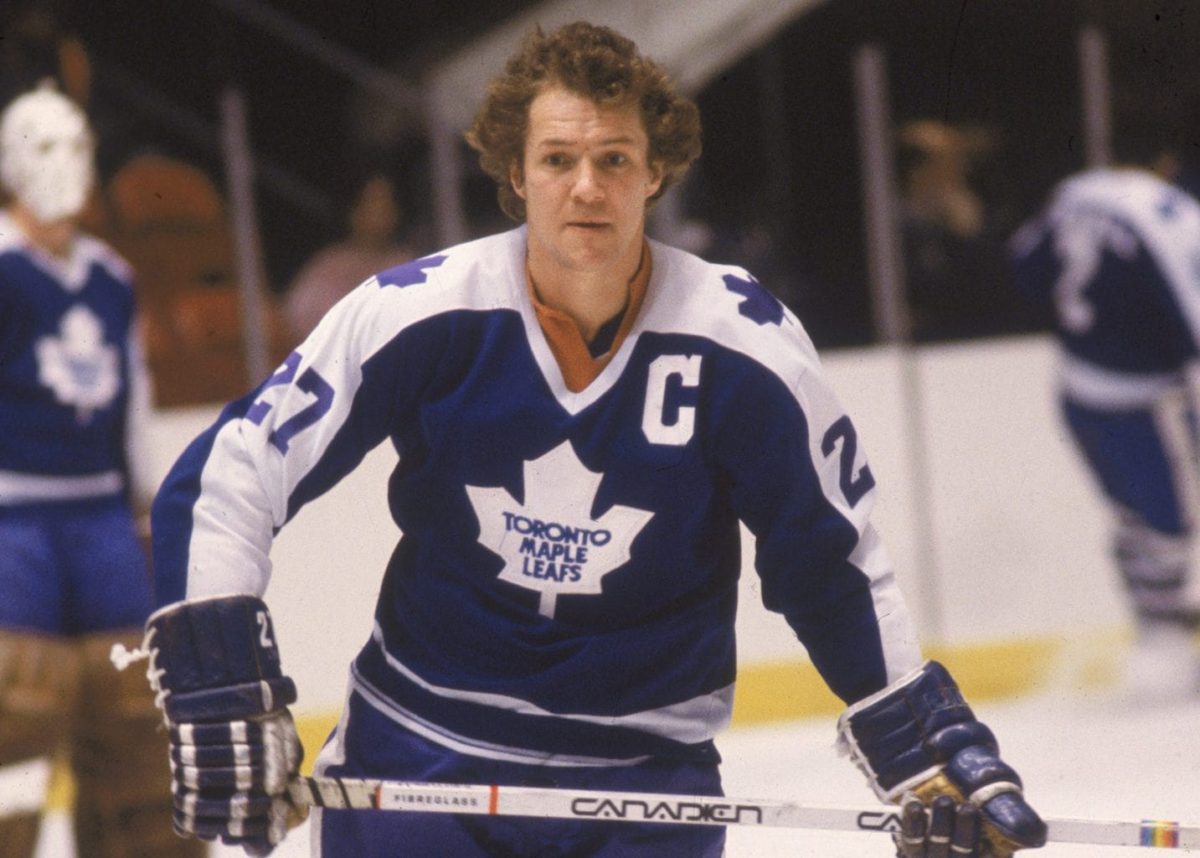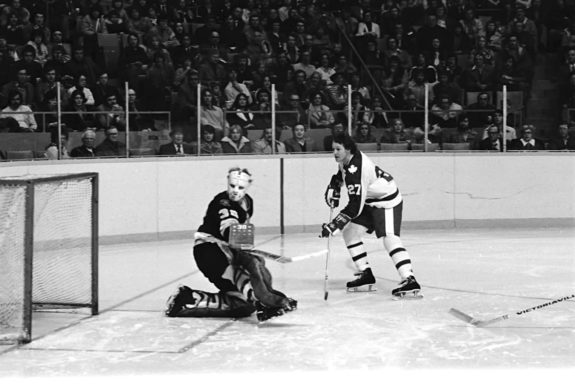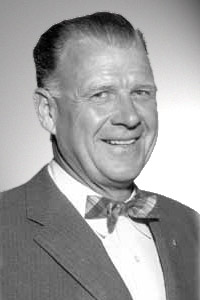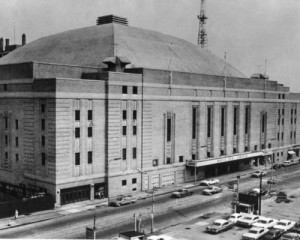Darryl Sittler, the most popular player in Toronto Maple Leafs history, captured the imagination of hockey fans everywhere. In his 15-year NHL career, he scored 484 goals, 637 assists, and 1,121 points in the regular season. And although he scored another 29 goals in the playoffs, his most famous tally came in overtime against Czechoslovakia to win the Canada Cup in 1976.
Sittler is tied to two of the best remembered and most remarkable performances in NHL history, etched into record books and memories alike, making him part of Canadian hockey lore. The first was a 10-point game on February 7, 1976, against Don Cherry and his powerful Boston Bruins. The second was a five-goal playoff game against Philadelphia’s Bernie Parent and the Broad Street Bullies.
Darryl Sittler Growing Up
Sittler was a quintessential Canadian who spent his youth playing on frozen ponds and outdoor rinks. Born on Sept. 18, 1950, in the rural town of St. Jacobs, Ontario, just northwest of Kitchener, he was one of eight children. Though it’s within a 90-minute drive of Toronto, he never once went to Maple Leaf Gardens as a fan.

“The first time I went in there, I played there,” says the Hockey Hall of Famer. “I remember it well. It just seemed so big.” (from ‘Leafs’ legend Darryl Sittler honoured at St. Jacobs Farmers’ Market,’ Toronto Sun, 10/14/2017)
Surprisingly, Sittler wasn’t a Leaf fan, either. “I grew up as the only Montreal Canadiens fan in a family of Toronto Maple Leafs followers,” Sittler admitted in his autobiography, Sittler.
RELATED: How the Leafs Were Able to Snag Hall of Famer Terry Sawchuk
At the age of 15, his play was already raising eyebrows. In junior, he was a star player for the London Knights of the Ontario Hockey Association. After an impressive 63-point season in his first year, he took the league by storm with seasons of 90 and 99 points in 53 and 54 games, respectively.
When Sittler was selected with the Leafs’ first pick (eighth overall) in the 1970 Entry Draft, he had no idea. “I’d been a Maple Leaf about five or six hours before I found out. I heard the news on the radio on the way home from my summer job that evening,” he recalled.
Early Years – Sittler #27
When Sittler was given his sweater with No. 27, he knew the Leafs’ front office had high expectations of him. Frank Mahovlich had previously worn the number with great success. “It gave me a really good feeling when I was handed his number,” said Sittler.
Sittler saw limited action in his rookie year (1970-71) due to a broken bone in his wrist that sidelined him for nearly three months. In his sophomore season, his wrist was still bothering him. He played through the pain with a brace and put up 32 points.
Opportunity knocked for Sittler in his third season when center Jimmy Harrison left for the WHA and Norm Ullman became sidelined with an injury. Playing between Rick Kehoe and Denis Dupere, Sittler found his stride, tallying 77 points. That total served as a watermark, one that he topped in nine of his twelve subsequent seasons.
He followed that up with a 38-goal, 46-assist season in 1973-74. According to Sittler, having success that year was really important. “I had signed only a one-year contract and if I expected a fat contract from the Leafs, I had to illustrate to the management that I deserved one.” Soon thereafter, he inked a five-year deal.
With the franchise in transition and many veterans retiring or being traded, Sittler brought stability. New players Inge Hammarstrom, Lanny McDonald, Borje Salming and Ian Turnbull joined the team. Red Kelly took over as head coach. When Dave Keon was traded after the 1974-75 season, Sittler became the second-youngest captain in team history at just 24 years old. “We wanted a captain who wasn’t afraid to speak up for his teammates, and who is respected by both players and management,” stated the team’s general manager, Jim Gregory. “Sittler was the man.”
1975-76: A Phenomenal Year
Sittler entered into elite status in 1975-76 when he re-wrote the record book.
10-Point Game
In a game against the Boston Bruins on Feb. 7, 1976, at Maple Leaf Gardens, Sittler etched his name in the NHL record books in a way that will likely never be duplicated. He erupted for a magical and mind-boggling 10-point game. It set an NHL record that still stands today for most points in a game: 10. Even Wayne Gretzky, the highest-scoring player in NHL history, never achieved that level of brilliance in a single game.
“Every time he stepped on the ice, you knew something was going to happen,” said linemate Lanny McDonald.
The Leafs trounced the Bruins 11-4. Sittler had two assists in the first period, three goals and two assists in the second and another hat trick in the third. The previous record for points in one game was held by Maurice “Rocket” Richard with eight.
The Leafs’ statistician gave Sittler the heads-up about the single-game record during the second intermission. His tenth point of the night (his sixth goal) was actually a pass that bounced off Bruins’ defenseman Brad Park into the net. After the game, Sittler couldn’t begin to explain his performance for the ages. This night, like throughout his career, Sittler always attributed his success to work rather than raw talent.
The record-setting performance vaulted Sittler to the 100-point plateau (41G, 59A), becoming the first Maple Leaf to do so in a single season.

“I’m proud to hold the record,” said Sittler. When asked if it will ever be broken, he added, “At some point, something might happen for some player where it may all come together. You never say never, but it’s a longshot. There are very few times when 10 goals are scored by one team, let alone for one player to be in on all 10.”
A 5-Goal Playoff Game
Sittler’s sensational scoring continued into the playoffs that year. On April 22, when playing against the Philadelphia Flyers in the Conference Semifinal, Sittler erupted for five goals in an 8-5 win. It tied a playoff record, adding his name to Maurice Richard’s record achievement. (Reggie Leach and Mario Lemieux have since duplicated the feat as well.) Red Kelly, the Leafs’ head coach from 1973-77 was a superstitious guy who invoked ‘Pyramid Power’ to help motivate his team. Legend has it Kelly’s sons gave him an idea to use the supernatural powers of Egyptian pyramids to give them some mojo. The souvenir shop miniatures were placed under the Leaf bench and in the dressing room.
You may also like:
- Maple Leafs Won’t Go Far with Samsonov in Net
- Maple Leafs News & Rumors: Marchand, Domi, Samsonov & Nylander
- Maple Leafs in 2-1 Hole to Bruins After Game 3 Loss
- Maple Leafs Test William Nylander for Concussion Concern
- Prime Video to Carry National Monday Night Games in Canada
“I put my sticks underneath it hoping it might help,” Sittler added. It seemed to help. However, he was also wearing his lucky tie. “I have a tie I wear when it’s a crucial game,” admitted Sittler. “I wore it one night when I got three goals. I had it on the time I had the ten points against Boston. I felt this game was so crucial, I went to the cleaners to pick up the tie specially.”
Regardless of where the luck came from, Sittler had another remarkable game. “I don’t really know how to describe how I feel. I guess I feel lucky,” said the forward.
Canada Cup Winner
Another defining game for Sittler – one that he later called his career highlight – came on Sept. 15, 1976, during the Canada Cup final at the beloved Montreal Forum. That night, he scored the tournament-winning goal in overtime on a partial breakaway, to win 5-4.
In his autobiography, he told the story behind the goal. Don Cherry, an assistant coach of the team, addressed the team in the locker room before the overtime started. “I’ve been upstairs watching this guy, Dzurilla, for three games. He likes to come out real fast to cut down the angle on any rush. After you go in over the blueline, fake a slapper. If you see him come out of his net, draw it back in and go wide and deeper. He’ll leave you with most of the net empty.”
In overtime, Sittler followed Cherry’s advice to the letter. He entered the zone on the left wing, faked a shot, drawing Czech goalie Vladimir Dzurilla out of position, then fired the puck easily into an open net.
“After I scored the goal, the whole team surrounded me out on the ice and we went into a group hug with Lanny (McDonald) leading the world in oxygen-threatening squeezes and hollering.”
Sittler instantly became an overnight hero in Canada. The goal cemented his place among Canadian hockey heroes as Team Canada won the best-of-three finals, two games to none. “It was an experience I’ll never forget. Just being on the team was fantastic,” said Sittler with genuine excitement in his voice. “That was the only championship team I was on,” he said later. “When you represent your country, there’s something pretty exciting and passionate about that.”
The Middle Years
Sittler built on his breakout year by putting up 117 points (45G, 72A) in 1977-78 and leading the team into the Conference Final against the Montreal Canadiens.

In 1979-80, the Leafs began to unravel. Crotchety owner Harold Ballard cleaned house and brought in Punch Imlach again. The duo desperately grappled for power and respect, belittling players in the process. In one over-reaching example of them asserting themselves, they prohibited players to make a good-natured promotional appearance.
Sittler’s agent, Alan Eagleson, and the Leafs’ new front office were like oil and water. Sittler himself was also a target due to his commanding presence in the locker room. Imlach soon traded and shipped away several of Sittler’s friends. Sittler’s no-trade clause shielded him, but many of his friends became casualties of the power struggle.
Pat Boutette, Sittler’s former teammate with the London Nationals, was jettisoned to the Hartford Whalers. Dave Hutchison was traded. Tiger Williams was booted to the Vancouver Canucks. When close friend Lanny McDonald was sent to the Colorado Rockies, it hit Sittler so hard he lashed out by using a pair of scissors to cut the ‘C’ from his sweater.
“The shock was so palpable, some of the guys fell back or slumped in their seats as if they’d been struck physically,” Sittler recalled in his autobiography. He then gave an emotional speech to his teammates, explaining what he was doing and the reasons behind his decisions.
“Imlach was trying to break down this whole team, didn’t want me as captain and wouldn’t let me function as one.” Sittler continued, “I had my mind made up that I wanted to stay in Toronto. I was going to outlast this guy (Imlach). I didn’t deserve any of this, I couldn’t understand why it was happening to me, but I could overcome it.”

Finally, enough was enough and Darryl waived his no-trade clause. In a letter, he told management that becoming captain of the Leafs was the happiest day of his life but the current standoff was intolerable and he could no longer in good faith occupy the role. He resigned as captain and no one was named to replace him. Ballard was incensed and threatened to lock Sittler out before the following season. Eventually, they came to a truce of sorts and Sittler returned as captain. But it didn’t last. Halfway through the 1981-82 season, Sittler decided he’d had enough with leadership and demanded a trade.
On Jan. 20, 1982, he was sent packing to the Philadelphia Flyers by Gerry McNamara who had replaced Imlach as the Leafs’ GM. The Leafs’ return was Rich Costello, a second-round pick in the 1982 draft (#25 Peter Ihnacak) and future considerations (Ken Strong).
Life as a Flyer
Sittler put up 83 points in his first season with the Philadelphia Flyers. The romance didn’t last though as he only played two seasons in Philadelphia before being abruptly traded to the Detroit Red Wings for forwards Murray Craven and Joe Paterson just before the 1984-85 season started. He struggled with the Wings for a year and decided to hang up his skates.
A few years later, he returned to where it all began, becoming a consultant to then-general manager Cliff Fletcher.
Darryl Sittler Enters the Hockey Hall of Fame
Sittler was inducted into the Hockey Hall of Fame In 1989. His Inductee Class included Herbie Lewis, Vladislav Tretiak, and Alan Eagleson.
The Maple Leafs raised a banner to the rafters with his name and No. 27 and honored him with a touching tribute at the Air Canada Centre on Feb. 8, 2003, prior to a game against the Montreal Canadiens. “It’s the highest honor you can receive from an organization you played for. To have my name on that banner hanging from the rafters is very special,” offered an emotional Sittler.
The banner raising was originally scheduled for Oct. 3, 2001, but Sittler’s wife Wendy was suffering from colon cancer and was too ill to attend. Darryl pleaded to postpone the occasion and his wife passed a few days later. Her name was included in the bottom corner of the Sittler’s banner.
His Life Today
Sittler is still in the hockey world, working in public relations for Maple Leaf Sports and Entertainment. He’s also an active member of the Board of Directors of several companies and supports many charities including Special Olympics Canada, Screen Colons Canada, and Colon Cancer Canada in honor of his late wife Wendy.
Sittler’s Legacy
Looking back at his Hall of Fame career, Darryl Sittler feels fortunate to make a living while playing a game he loved so much. He didn’t have the best shot, he wasn’t the fastest skater and he didn’t have break-your-ankle dekes. His strengths were his character and leadership. These traits carried the rich history of an Original Six franchise through some of its darkest days with the villainous front office of Ballard and Imlach.
Though he never won a Stanley Cup, Sittler was a part of some amazing teams and memorable moments in Canadian history. His workmanlike, humble, grind-it-out and get-it-done style won over fans who appreciated his effort on every shift of every game.

